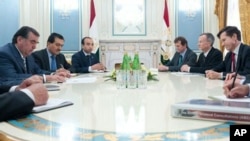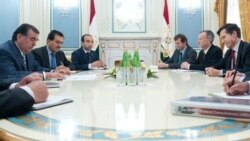One of the greatest threats the world faces is the proliferation of weapons of mass destruction.
In Berlin, President Barack Obama laid out additional steps to help prevent the spread of the world’s most dangerous weapons by announcing that he intends to negotiate cuts with Russia to move beyond Cold War nuclear postures and reduce U.S. deployed strategic nuclear weapons by up to one-third. The goal, he said, is a world in which “peace with justice means pursuing the security of a world without nuclear weapons.”
The United States is also looking to cooperate with Russia’s neighbors on nonproliferation. Tajikistan, said Deputy Assistant Secretary of State for Nonproliferation Programs Simon Limage this week in Dushanbe, has proven an invaluable partner in its efforts to secure its borders against the illicit flow of weapons of mass destruction materials by strengthening both its infrastructure to detect and its capacity to enforce.
To support these efforts, the Department of State’s Export Control and Related Border Security program and Tajik Customs are in the final phase of establishing a training area for Tajik Customs officers. Once completed, the facility will allow Tajik Customs to train on customs-related inspection and detection scenarios, including with the use of radiation detection equipment.
In addition, the United States applauds Tajikistan’s work to develop a new legal framework for controlling trade in strategic goods that could contribute to proliferation of weapons of mass destruction, and looks forward to adoption of the legislation. This will pave the way for Tajikistan to become a Central Asian leader in bringing its strategic trade controls closer to international standards.
The United States remains concerned that nuclear materials around the world may remain available on the black market and could potentially fall into terrorist hands. That’s why the United States also applauds Tajikistan’s work to improve its counter nuclear smuggling capabilities, including implementing steps identified in the Joint Action Plan to Counter Nuclear Smuggling that both governments signed in 2011.
President Obama has been steadfast in his commitment to eliminate the global threat of nuclear weapons. The U.S.-Tajik bilateral nonproliferation partnership will continue to play a critical role in transforming Central Asia into a region that confronts these security threats.
In Berlin, President Barack Obama laid out additional steps to help prevent the spread of the world’s most dangerous weapons by announcing that he intends to negotiate cuts with Russia to move beyond Cold War nuclear postures and reduce U.S. deployed strategic nuclear weapons by up to one-third. The goal, he said, is a world in which “peace with justice means pursuing the security of a world without nuclear weapons.”
The United States is also looking to cooperate with Russia’s neighbors on nonproliferation. Tajikistan, said Deputy Assistant Secretary of State for Nonproliferation Programs Simon Limage this week in Dushanbe, has proven an invaluable partner in its efforts to secure its borders against the illicit flow of weapons of mass destruction materials by strengthening both its infrastructure to detect and its capacity to enforce.
To support these efforts, the Department of State’s Export Control and Related Border Security program and Tajik Customs are in the final phase of establishing a training area for Tajik Customs officers. Once completed, the facility will allow Tajik Customs to train on customs-related inspection and detection scenarios, including with the use of radiation detection equipment.
In addition, the United States applauds Tajikistan’s work to develop a new legal framework for controlling trade in strategic goods that could contribute to proliferation of weapons of mass destruction, and looks forward to adoption of the legislation. This will pave the way for Tajikistan to become a Central Asian leader in bringing its strategic trade controls closer to international standards.
The United States remains concerned that nuclear materials around the world may remain available on the black market and could potentially fall into terrorist hands. That’s why the United States also applauds Tajikistan’s work to improve its counter nuclear smuggling capabilities, including implementing steps identified in the Joint Action Plan to Counter Nuclear Smuggling that both governments signed in 2011.
President Obama has been steadfast in his commitment to eliminate the global threat of nuclear weapons. The U.S.-Tajik bilateral nonproliferation partnership will continue to play a critical role in transforming Central Asia into a region that confronts these security threats.






